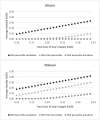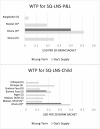Willingness to pay for small-quantity lipid-based nutrient supplements for women and children: Evidence from Ghana and Malawi
- PMID: 28960913
- PMCID: PMC6088232
- DOI: 10.1111/mcn.12518
Willingness to pay for small-quantity lipid-based nutrient supplements for women and children: Evidence from Ghana and Malawi
Abstract
Small-quantity lipid-based nutrient supplements (SQ-LNS) are designed to enrich maternal and child diets with the objective of preventing undernutrition during the first 1,000 days. Scaling up the delivery of supplements such as SQ-LNS hinges on understanding private demand and creatively leveraging policy-relevant factors that might influence demand. We used longitudinal stated willingness-to-pay (WTP) data from contingent valuation studies that were integrated into randomized controlled nutrition trials in Ghana and Malawi to estimate private valuation of SQ-LNS during pregnancy, postpartum, and early childhood. We found that average stated WTP for a day's supply of SQ-LNS was more than twice as high in Ghana than Malawi, indicating that demand for SQ-LNS (and by extension, the options for effective delivery of SQ-LNS) may be very context specific. We also examined factors associated with WTP, including intervention group, household socioeconomic status, birth outcomes, child growth, and maternal and child morbidity. In both sites, WTP was consistently negatively associated with household food insecurity, indicating that subsidization might be needed to permit food insecure households to acquire SQ-LNS if it is made available for purchase. In Ghana, WTP was higher among heads of household than among mothers, which may be related to control over household resources. Personal experience using SQ-LNS was not associated with WTP in either site.
Keywords: Ghana; Malawi; demand; small-quantity lipid-based nutrient supplements; willingness to pay.
© 2017 The Authors. Maternal and Child Nutrition published by John Wiley & Sons, Ltd.
Conflict of interest statement
The authors declare that they have no conflicts of interest.
Figures


References
-
- Adams, K. P. , Lybbert, T. J. , Vosti, S. A. , & Ayifah, E. (2016). Using an economic experiment to estimate willingness‐to‐pay for a new maternal nutrient supplement in Ghana. Agricultural Economics, 47, 581–595.
-
- Adu‐Afarwuah, S. , Lartey, A. , Okronipa, H. , Ashorn, P. , Peerson, J. M. , Arimond, M. , … Dewey, K. G. (2016). Small‐quantity, lipid‐based nutrient supplements provided to women during pregnancy and 6 mo postpartum and to their infants from 6 mo of age increase the mean attained length of 18‐mo‐old children in semi‐urban Ghana: A randomized controlled trial. The American Journal of Clinical Nutrition, 103, 797–808. - PMC - PubMed
-
- Adu‐Afarwuah, S. , Lartey, A. , Okronipa, H. , Ashorn, P. , Zeilani, M. , Peerson, J. M. , … Dewey, K. G. (2015). Lipid‐based nutrient supplement increases the birth size of infants of primiparous women in Ghana. The American Journal of Clinical Nutrition, 101, 835–846. - PubMed
-
- Alderman, H. (2010). The economic cost of a poor start to life. Journal of Developmental Origins of Health and Disease, 1, 19–25. - PubMed
-
- Arimond, M. , Zeilani, M. , Jungjohann, S. , Brown, K. H. , Ashorn, P. , Allen, L. H. , & Dewey, K. G. (2015). Considerations in developing lipid‐based nutrient supplements for prevention of undernutrition: Experience from the International Lipid‐Based Nutrient Supplements (iLiNS) Project. Maternal & Child Nutrition, 11(Supplement 4), 31–61. - PMC - PubMed
Publication types
MeSH terms
Substances
LinkOut - more resources
Full Text Sources
Other Literature Sources
Medical

